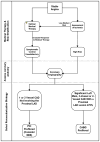Revascularization for coronary artery disease in diabetes mellitus: angioplasty, stents and coronary artery bypass grafting
- PMID: 20221852
- PMCID: PMC3076727
- DOI: 10.1007/s11154-010-9135-3
Revascularization for coronary artery disease in diabetes mellitus: angioplasty, stents and coronary artery bypass grafting
Abstract
Patients with diabetes mellitus (DM) are prone to a diffuse and rapidly progressive form of atherosclerosis, which increases their likelihood of requiring revascularization. However, the unique pathophysiology of atherosclerosis in patients with DM modifies the response to arterial injury, with profound clinical consequences for patients undergoing percutaneous coronary intervention (PCI). Multiple studies have shown that DM is a strong risk factor for restenosis following successful balloon angioplasty or coronary stenting, with greater need for repeat revascularization and inferior clinical outcomes. Early data suggest that drug eluting stents reduce restenosis rates and the need for repeat revascularization irrespective of the diabetic state and with no significant reduction in hard clinical endpoints such as myocardial infarction and mortality. For many patients with 1- or 2-vessel coronary artery disease, there is little prognostic benefit from any intervention over optimal medical therapy. PCI with drug-eluting or bare metal stents is appropriate for patients who remain symptomatic with medical therapy. However, selection of the optimal myocardial revascularization strategy for patients with DM and multivessel coronary artery disease is crucial. Randomized trials comparing multivessel PCI with balloon angioplasty or bare metal stents to coronary artery bypass grafting (CABG) consistently demonstrated the superiority of CABG in patients with treated DM. In the setting of diabetes CABG had greater survival, fewer recurrent infarctions or need for re-intervention. Limited data suggests that CABG is superior to multivessel PCI even when drug-eluting stents are used. Several ongoing randomized trials are evaluating the long-term comparative efficacy of PCI with drug-eluting stents and CABG in patients with DM. Only further study will continue to unravel the mechanisms at play and optimal therapy in the face of the profoundly virulent atherosclerotic potential that accompanies diabetes mellitus.
Figures
References
-
- Luscher TF, Creager MA, Beckman JA, Cosentino F. Diabetes and vascular disease: pathophysiology, clinical consequences, and medical therapy: Part II. Circulation. 2003;108:1655–61. - PubMed
-
- Haffner SM, Lehto S, Ronnemaa T, Pyorala K, Laakso M. Mortality from coronary heart disease in subjects with type 2 diabetes and in nondiabetic subjects with and without prior myocardial infarction. N Engl J Med. 1998;339:229–34. - PubMed
-
- Aronson D, Rayfield EJ, Chesebro JH. Mechanisms determining course and outcome of diabetic patients who have had acute myocardial infarction. Ann Intern Med. 1997;126:296–306. - PubMed
-
- Hasdai D, Granger CB, Srivatsa SS, Criger DA, Ellis SG, Califf RM, et al. Diabetes mellitus and outcome after primary coronary angioplasty for acute myocardial infarction: lessons from the GUSTO-IIb Angioplasty Substudy. Global Use of Strategies to Open Occluded Arteries in Acute Coronary Syndromes. J Am Coll Cardiol. 2000;35:1502–12. - PubMed
Publication types
MeSH terms
Grants and funding
LinkOut - more resources
Full Text Sources
Other Literature Sources
Medical
Miscellaneous


